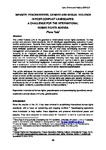Impunity, Peacekeepers, Gender and Sexual Violence in Post-conflict Landscapes: A Challenge for the International Human Rights Agenda
| dc.contributor.author | Tate, Fiona | |
| dc.date.accessioned | 2017-03-14T17:04:17Z | |
| dc.date.accessioned | 2017-04-11T09:03:50Z | |
| dc.date.available | 2017-03-14T17:04:17Z | |
| dc.date.available | 2017-04-11T09:03:50Z | |
| dc.date.issued | 2015 | |
| dc.identifier.citation |
Tate, F. (2015) ‘Impunity, Peacekeepers, Gender and Sexual Violence in Post-conflict Landscapes: A Challenge for the International Human Rights Agenda, Law, Crime and History, 5(2), pp. 69-96. Available at: https://pearl.plymouth.ac.uk/handle/10026.1/8925 | en_US |
| dc.identifier.issn | 2045-9238 | |
| dc.identifier.uri | http://hdl.handle.net/10026.1/8925 | |
| dc.description.abstract |
The United Nations (UN) is the guardian of international human rights standards. To help protect and promote these standards, the UN developed peacekeeping operations in postconflict environments. Recently there have been highly publicised reports of gender-based sexual exploitation and abuse committed by peacekeepers during deployment. These cases have revealed systematic failures with the UN and troop contributing countries’ (TCC) management and prosecution of these cases, and the violation of victims’ human rights. Immunity is an important aspect of UN peacekeeping operations. Peacekeepers are deployed in areas which are politically unstable, and ‘where normal institutions of law and order are not functioning.’ The UN extended immunity from host state prosecution to peacekeepers ‘to protect’ UN personnel from ‘harassment’ during missions, and to protect itself from suit for institutional negligence. International legal experts argue that immunity, and a subsequent ‘culture of impunity’, has resulted in TCC failing to exercise authority in cases of sexual exploitation and abuse committed by deployed peacekeepers. This article addresses the current responses of the UN and TCC to allegations of sexual exploitation and abuse committed by peacekeepers during missions. It will examine the extent to which conflict between immunity protections and institutional accountability reflect a larger conflict between the international ‘human rights and peace and security functions of UN governance operations.’ It will also attempt to reconcile legal and non-legal mechanisms introduced by the UN to deal with impunity, with current and emerging law on immunity and human rights, to identify a possible solution to these problems. | en_US |
| dc.language.iso | en | en_US |
| dc.publisher | University of Plymouth | |
| dc.rights | Attribution 4.0 International (CC BY 4.0) | * |
| dc.rights.uri | https://creativecommons.org/licenses/by/4.0/ | * |
| dc.subject | international human rights | en_US |
| dc.subject | peacekeepers and peacekeeping operations | en_US |
| dc.subject | sexual exploitation | en_US |
| dc.subject | sexual abuse | en_US |
| dc.subject | immunity | en_US |
| dc.subject | gender justice | en_US |
| dc.title | Impunity, Peacekeepers, Gender and Sexual Violence in Post-conflict Landscapes: A Challenge for the International Human Rights Agenda | en_US |
| dc.type | Article | en_US |
| dc.type | Article | |
| plymouth.issue | 2 | |
| plymouth.volume | 5 | |
| plymouth.journal | SOLON Law, Crime and History |



